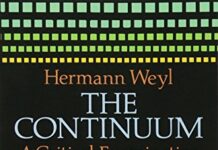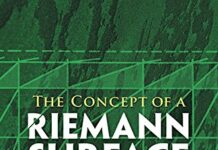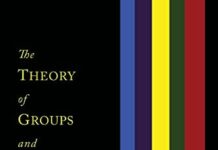
Ebook Info
- Published: 2013
- Number of pages: 258 pages
- Format: PDF
- File Size: 3.43 MB
- Authors: Hermann Weyl
Description
This original anthology assembles ten accessible essays by a giant of modern mathematics. Hermann Weyl (1885–1955) made lasting contributions to number theory as well as theoretical physics, and he was associated with Princeton’s Institute for Advanced Study, the University of Göttingen, and ETH Zurich. Spanning the 1930s–50s, these articles offer insights into logic and relativity theory in addition to reflections on the work of Weyl’s mentor, David Hilbert.Subjects include “Topology and Abstract Algebra as Two Roads of Mathematical Comprehension,” “The Mathematical Way of Thinking,” “Relativity Theory as a Stimulus in Mathematical Research,” and “Why is the World Four-Dimensional?” Historians of mathematics, advanced undergraduates, and graduate students will appreciate these writings, many of which have been long unavailable to English-language readers.
User’s Reviews
Reviews from Amazon users which were colected at the time this book was published on the website:
⭐This collection of reflections by Hermann Weyl is often quirky, controversial, provocative, and perhaps a bit “weird”. But it is serious background commentary on a wide range of intellectual endeavours in logic, mathematics, physics, philosophy and other areas. It’s really fascinating to read.Hermann Klaus Hugo Weyl was a prolific innovator in a broad range of physics (particularly general relativity), mathematics and logic. He saw the philosophical significance in everything, which is not surprising for his time because physics used to be called “natural philosophy”, and that perhaps is still a more accurate description of the core objectives of physics. (Nowadays many people think that the purpose of physics is to provide discoveries which can be exploited by engineers and entrepreneurs to make new products. The economic benefits of physics are really only a felicitous by-product of philosophical investigations.)At the moment, I’m using this Dover book,
⭐, for its insightful background comments on the early development of mathematical logic, particularly regarding the successes and failures of the formalist school of thinking led by Hilbert, and the effects on the formalist research program by Gödel and Gentzen in the 1930s. Weyl seems to have the technical details at his fingertips, for example the significance of Gentzen’s transfinite proof of the consistency of number theory, which counteracted the famous negative result by Gödel, which said that number theory could not be proved to be consistent by logical arguments within the number theory framework. Gentzen’s contrary theorem is less well known.You can see the table of contents and other information in the Amazon preview. So I won’t attempt to summarize this book. It is too broad in its scope to summarize anyway!Weyl’s ability to make connections between wide-ranging subjects was evident already in his much earlier
⭐, where even the most technical aspects of general relativity are interpreted, as they should be, for their consequences for natural philosophy. In this “Levels of Infinity” collection, Weyl really seems to let loose and say exactly what he thinks. Even if he does seem a bit quirky, and you might not agree with everything he says, he was one of the deep thinkers, perhaps comparable to Ernst Mach in many ways.
⭐Very interesting collection of “elementary” articles by Herman Weyl. Weyl is not the easiest read but, as one of the great 20th Century scientists, there is much to be gleaned from what he writes.
⭐Weyl talked about philosophy of mathematics.
⭐A classical book.
⭐This is bit of a different reading experience. These are essentially transcripts of lectures given by Weyl, but don’t let that dissuade you from reading them as they are well-edited. They also go quite deep into the weeds of mathematical notation and thought at times, so unless you are well-versed in the areas Weyl covers, you are likely to either get lost or think hard (esp. because the notation and wording can be somewhat different than modern mathematics). But Weyl brings out interesting points and usually does a good job of explaining the main idea of what he is getting at. The obituaries for Hilbert and Noether are excellent for explaining the accomplishments of these amazing mathematicians. The last essay on why the world has 4 dimensions was also one of my favorites.If you aren’t willing to deal with more advanced mathematics, then this book won’t be of interest. Also there are a couple of pieces with parts that repeat previous ones. This makes sense since they are lectures on similar topics sometimes, but it’s something to be aware of even if it is not extremely common.
⭐One of the best books on the subject.
⭐Ein weiterer dankenswerter Beitrag von Dover für alle, die wissen: Das Studium der Originalliteratur ist durch nichts zu ersetzen. Die Einführung ist hilfreich.
⭐
Keywords
Free Download Levels of Infinity: Selected Writings on Mathematics and Philosophy (Dover Books on Mathematics) in PDF format
Levels of Infinity: Selected Writings on Mathematics and Philosophy (Dover Books on Mathematics) PDF Free Download
Download Levels of Infinity: Selected Writings on Mathematics and Philosophy (Dover Books on Mathematics) 2013 PDF Free
Levels of Infinity: Selected Writings on Mathematics and Philosophy (Dover Books on Mathematics) 2013 PDF Free Download
Download Levels of Infinity: Selected Writings on Mathematics and Philosophy (Dover Books on Mathematics) PDF
Free Download Ebook Levels of Infinity: Selected Writings on Mathematics and Philosophy (Dover Books on Mathematics)




